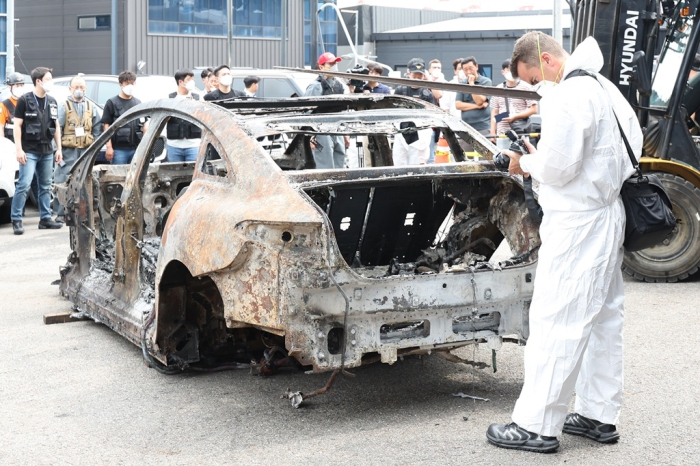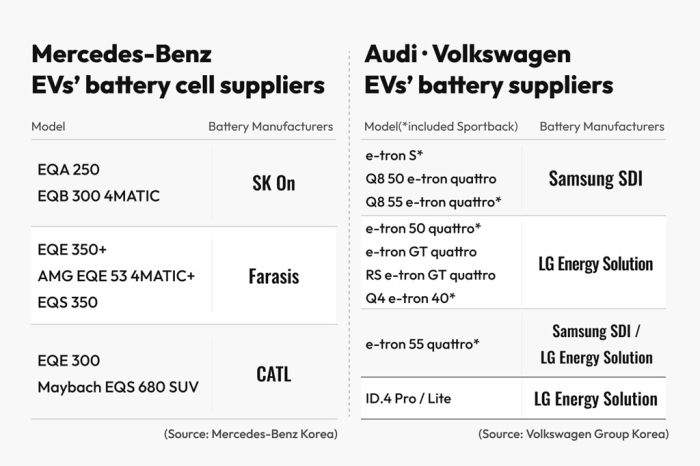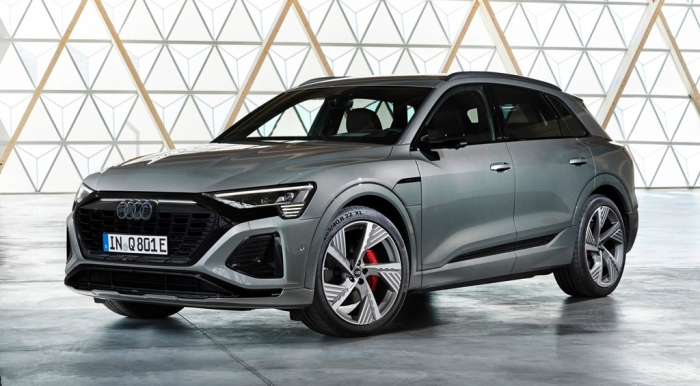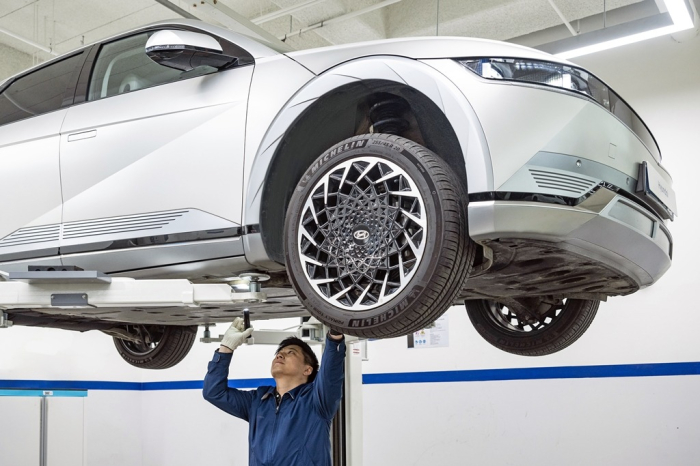Electric vehicles
Fire-plagued Mercedes uses Chinese cells for most EVs in S.Korea
Audi and Volkswagen sell EVs in Korea that are equipped with cells only by LG Energy, Samsung SDI
By Aug 14, 2024 (Gmt+09:00)
2
Min read
Most Read
S.Korea's LS Materials set to boost earnings ahead of IPO process


Carlyle, Keppel, IMM stay in final race for Ecorbit


Gas maker Air Products Korea put on sale for around $3.6 bn


K-content powerhouseŌĆÖs YouTube channels disrupted by hacks


Mercedes, BMW, Audi, VW offer deep discounts amid EV phobia in Korea



Mercedes-Benz AG, a German luxury carmaker hit by an electric vehicle fire in South Korea, said most of its EV models in the country are equipped with Chinese-made cells.
Mercedes-Benz Korea Ltd. on Tuesday disclosed the manufacturers of its EV battery cells amid mounting pressure from the government and customers. It came after its EQE electric sedan, with cells reportedly produced by Chinese company Farasis Energy Inc. caught fire in an apartment building garage in Incheon, west of Seoul, earlier this month.
ŌĆ£All Mercedes-Benz EV batteries are manufactured by Mercedes-BenzŌĆÖs 100%-owned subsidiaries, while various manufacturers supply battery cells,ŌĆØ the Korean unit of the German carmaker said on its website.
In the EQE sedan lineup, the EQE 300 is the only trim equipped with cells produced by Contemporary Amperex Technology Co. Ltd. (CATL), the world's top battery maker. The EQE 350+, the AMG EQE 53 4MATIC+ and the EQE 350 4MATIC all use cells by Farasis.
For its EQE SUV models, Mercedes-Benz uses cells by Farasis for the EQE 500 4MATIC SUV and battery products by ChinaŌĆÖs CATL for the EQE 350 4MATIC SUV.
The automaker uses CATLŌĆÖs cells for most EVs in its upper-class EQS line including the Mercedes-Maybach EQS 680 SUV.
Mercedes-Benz uses cells from KoreaŌĆÖs SK On Co., the worldŌĆÖs fifth-largest battery maker, for lower-end models such as the EQA 250 and the EQB 300 4MATIC. The discontinued EQC 400 4MATIC was equipped with cells by LG Energy Solution Ltd.
ŌĆ£We are cooperating with [Korean] authoritiesŌĆÖ investigations to figure out the exact cause of the incident,ŌĆØ Mercedes-Benz Korea said, referring to the Aug. 1 fire. ŌĆ£We are doing our utmost to identify the root cause and take follow-up measures.ŌĆØ

VOLKSWAGEN EVS EQUIPPED WITH KOREAN BATTERIES
Volkswagen AG, the worldŌĆÖs second-largest automaker, said its EV models are equipped with Korean-made batteries.
The German automaker said all EV models in its Audi luxury brand use batteries manufactured by LG Energy and Samsung SDI Co.
Samsung SDI, the worldŌĆÖs sixth-largest battery maker, supplies cells for the electric SUV e-tron including the Sportback trim and the premium electric SUV Q8 e-tron line. LG Energy provides cells for the e-tron GT quattro, the RS e-tron GT quattro and the compact electric SUV Q4 e-tron series.

The two Korean battery makers also supplied cells for the discontinued e-tron 55 quattro.
Volkswagen equips the electric crossover SUV ID.4 sold in Korea with LG Energy cells.
TO ALLEVIATE SAFETY CONCERNS
The disclosures came as local and foreign carmakers scrambled to ease safety concerns in the country over EVs and batteries, especially those made by Chinese companies, after the fire.
The blaze took more than eight hours to put out and damaged at least 16 other vehicles, boosting EV-phobia and placing added pressure on automakers, which have been struggling with the sustained weakness in the green vehicle industry.
Hyundai Motor Co. and Kia Corp., the countryŌĆÖs two biggest carmakers, as well as foreign brands such as BMW and Volvo, have since disclosed their EV battery and cell suppliers.

Hyundai and Kia said they will provide safety inspection services for all EVs in the country indefinitely.
Write to Jae-Fu Kim at hu@hankyung.com
┬Ā
Jongwoo Cheon edited this article.
More to Read
-
 Electric vehiclesMercedes, BMW, Audi, VW offer deep discounts amid EV phobia in Korea
Electric vehiclesMercedes, BMW, Audi, VW offer deep discounts amid EV phobia in KoreaAug 12, 2024 (Gmt+09:00)
3 Min read -
 Electric vehiclesHalf of EV imports in Korea run on Chinese batteries as EV fires rise
Electric vehiclesHalf of EV imports in Korea run on Chinese batteries as EV fires riseAug 09, 2024 (Gmt+09:00)
4 Min read -
 AutomobilesMercedes-Benz ranked first in KSQI imported car dealership
AutomobilesMercedes-Benz ranked first in KSQI imported car dealershipJul 31, 2024 (Gmt+09:00)
1 Min read
Comment 0
LOG IN


